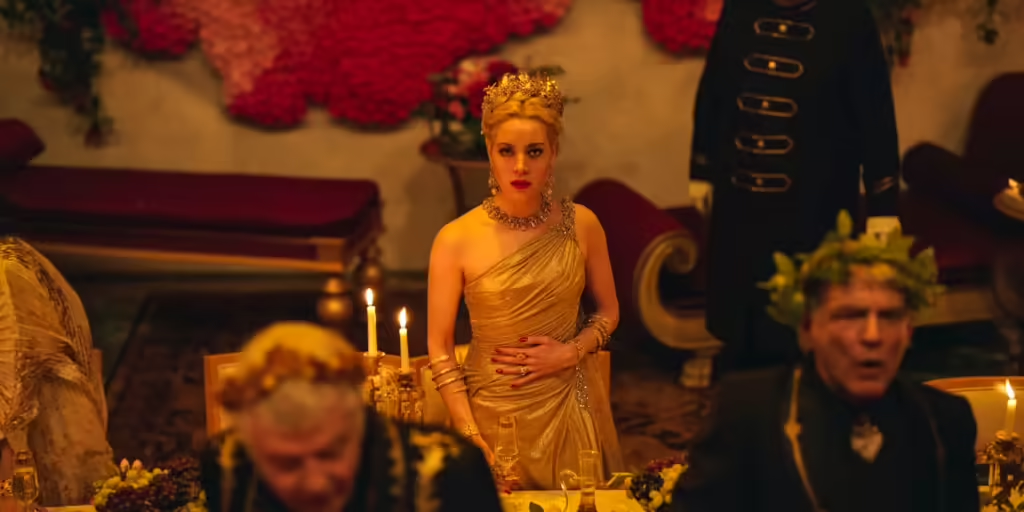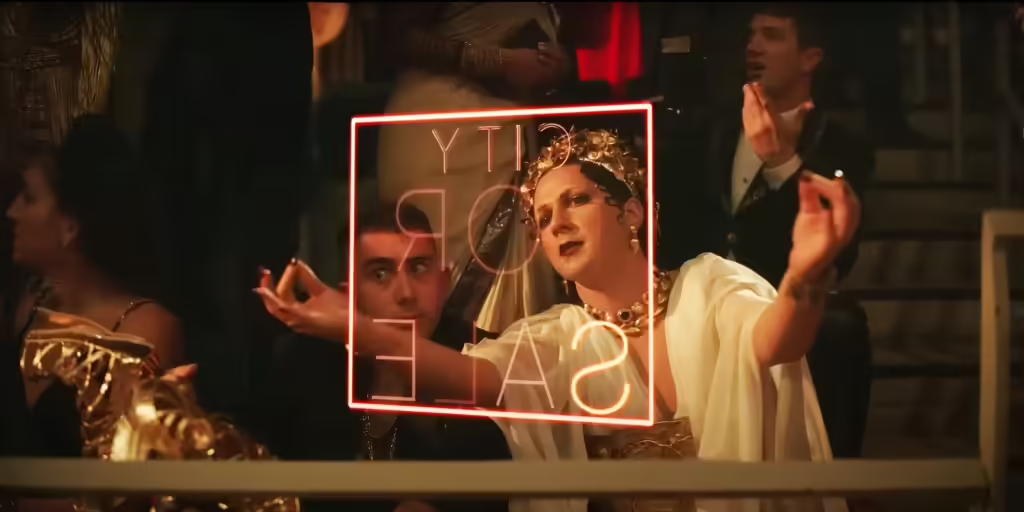If ambition equaled greatness, Francis Ford Coppola’s behemoth Megalopolis would be the movie of the year. But outsized vision gets the better of the master filmmaker’s four decade passion project, one reportedly on his mind since he traipsed the Philippine jungles of 1979’s Apocalypse Now. Self-financing to the tune of $120m (Coppola reportedly sold much of his stake in his wine business), the eighty-five-year-old auteur legend takes a huge gamble on his own terms with neither corporate meddling or a modicum of restraint. The result? An extravagantly imagined, 138-minute folly of the kind only the most talented people—serving an unbridled mania without question—can make.
A gargantuan “fable” positing the fall of the Roman Empire in a futuristic New York (titled New Rome here—really?) and doubling as caution for the current American political climate, Megalopolis stars a laconic Adam Driver as a Nobel-winning, Howard Roark-esque architect by way of Fritz Lang’s Metropolis named Cesar Catilina (with a Cesar haircut, naturally), whom we first meet about to leap from the film’s CGI-sheen version of the Chrysler building. Cesar, by the way, has the nifty ability to stop time (a pointlessly dangling plot device), a byproduct of creating a new substance named Megalon. That substance, an ultra-resilient new building material, is critical to his new urban development project Megalopolis, which promises to displace and resettle many of Gotham’s urbanites.
Still reeling from his wife’s tragic death in a car wreck, Cesar throws himself into this visionary quest, sketching out an urban planning utopia to be built with his Megalon. His grand plan? A sleek, modular city that will forever change the face of New Rome—or something along those lines. This radical idea rubs traditionalist Mayor Cicero (Giancarlo Esposito) the wrong way. Cicero is more concerned with the here and now, preferring to tackle New Rome’s gritty socioeconomics rather than indulge in what he sees as Cesar’s sci-fi dreams. Then there’s the matter of Cicero attempting to implicate Cesar in his wife’s death, casting doubt on his character. Enter Julia (Nathalie Emmanuel), the mayor’s independent, party-girl daughter, who defies the feud and takes a liking to Cesar—even though he scoffs at her father’s ideals. It’s sort of a clash of titans, where love crosses ideological lines. Or at least, it should be. Instead, Emmanuel’s lackluster performance drains the drama, making the rift feel like little more than a polite disagreement.

Across town, we meet Cesar’s uncle, the rich banking mogul Hamilton Crassus, played by none other than the once-great Jon Voight in full Trumpian swagger. Talk about typecasting. He’s caught up in an affair with a character named Wow Platinum (yes, you read that right), a vampy news reporter who’s also cozying up to Cesar. The usually great Aubrey Plaza is stranded in this role, which feels like a missed opportunity to craft a fun femme fatale. Then there’s Crassus’ black sheep son and Cesar’s cousin, Clodio—Shia LaBeouf doing his best to channel something like “scheming future politician,” albeit one decked out in drag for an elaborate bacchanalian bash that feels like a wan homage to Fellini Satyricon. This is not LaBeouf’s finest hour, to say the least.
And it gets weirder. We’re treated to New Rome’s teenage pop star (America’s Got Talent’s Grace VanderWall), who is somehow also the city’s “vestal virgin,” an out-of-nowhere Elvis impersonator, scattered 9/11 references and Madison Square Garden reimagined as a Roman coliseum. Meanwhile, Dustin Hoffman wanders in for a cameo, ranting about construction like it’s life-or-death. And let’s not forget poor Laurence Fishburne, a great actor stuck narrating this muck while gravely quoting Marcus Aurelius and reading stone tablet title cards (that we can read ourselves) like they mean something Very Deep.

Then there’s the painfully awkward gimmick of a live interlude: late in the picture, the auditorium’s house lights come up and an “audience member” awkwardly grabs a microphone to grill Cesar in the middle of a contrived press conference. At my screening, Driver’s delayed response made it even more uncomfortable. And what about the great Kathryn Hunter? Criminally underused, barely showing up as Esposito’s wife before being shuffled off on a fancy moving walkway ride that goes nowhere, like the movie. But the biggest embarrassment belongs to Voight, delivering the pièce de résistance: “What do you think of this boner?” Yes, that’s an actual line. Picture Coppola, of all people, writing that into the script. These top-tier actors are left floundering in what can only be described as an overstuffed fever dream—bizarre, self-important, and nowhere near as epic as it pretends to be—melodramatic yet cold, and above all, boring. It is borderline camp but really no fun.
Sure, Megalopolis might be Coppola’s passion project, a large scale vision of American decline with a hopeful belief in collective human potential. But for the rest of us it is a tedious chore dressed up in cartoonish seriousness with occasionally snazzy production design. Whatever personal meaning it holds for Coppola doesn’t translate into anything enlightening—or enjoyable—for the audience.
1 star



